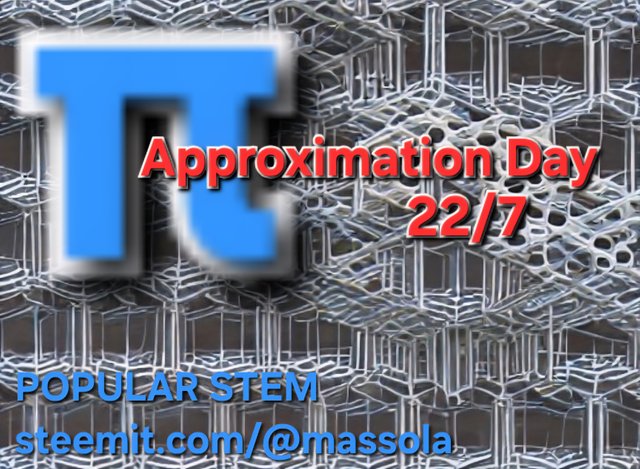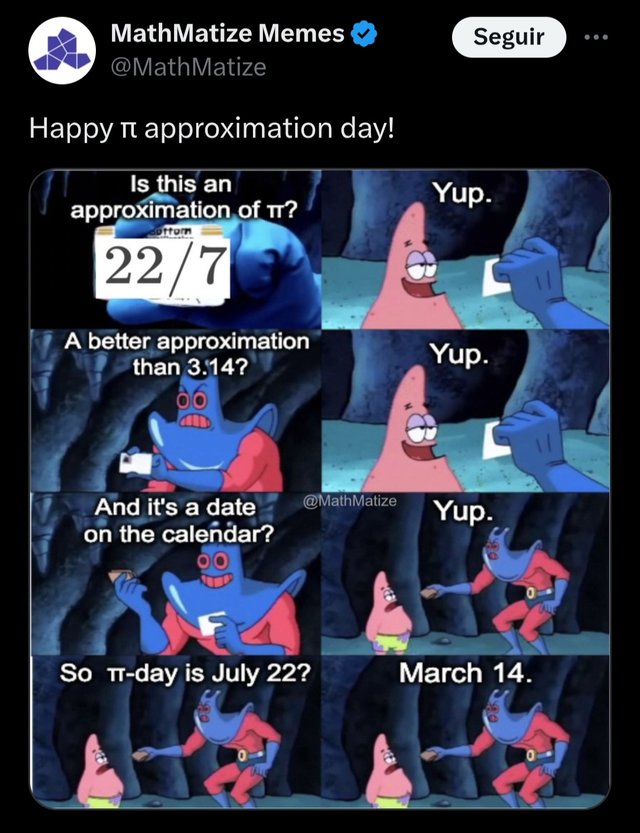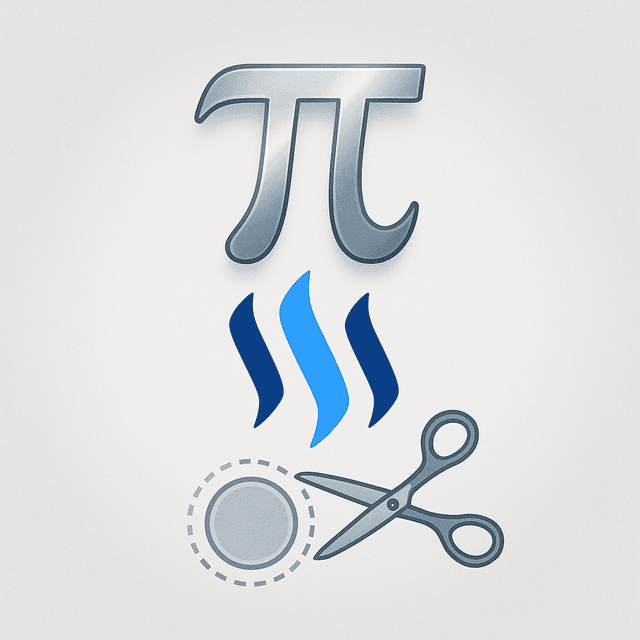About the Pi π Approximation Day - 22/7
Greetings, mathematical travelers!
It's good to be back here writing again; and not only to be writing in Popular STEM community and to be writing about my beloved Mathematics, but also to be here, in this exact moment, breathing calmly and happy to have the opportunity to share my thoughts through these words that aren't even from my native language, and to be able to feel better about it. I've had the pleasure of reading so many incredible people's words in English throughout my existence in this world, from the unique planets and dimensions of Douglas Adams, to the metodical detective adventures told in the words of Sir Arthur Conan Doyle. In a way it feels special to also be able to state my thoughts, just like they did, you know?
Background image created with Stable Diffusion in Jan/2023 for my Undergraduate Final Thesis, and text added with the Samsung Gallery app
I know that I'm some dozen hours late from the end of the Pi π Approximation Day, but let me just also register my appreciation for whoever put on the top of the Wiki page for Pi Day, which is where the hyperlink above takes you, that states:
Not to be confused with National Pie Day.
That's simply amazing. And life is, indeed, sometimes amazing; but life is also sometimes about not being able to deliver when we initially expected, but replanning our schedule to accomodate it and transform what we create not in spite of the unexpected delay, but because of it. Life's unpredictable, as are humans; I do not believe we should aim to live as we expect, too. And if I can tell you about something that is filled with unexpected things, that is Mathematics. To only mention a few, you should definitely learn more about the classic How the Sum of All Natural Numbers can be a Negative Value Being Used in Physics (video by Numberphile, 2014) and the mind-blowing The Banach–Tarski Paradox (video by Vsauce, 2015). And these two examples are only some of the more extreme ones that the Mathematics as we axiomatically defined allow for, but a lot of the simpler steps in the learning experience are "not intuitive", which is a term that most educators are not fond of, because of the lack of its objectivity. However, definitely the most unexpected thing that happened during my journey as an undergraduate student: I found the most caring and loving person I've ever met, and she's been my partner for almost two years already. Time sure goes by fast, which reminds me: A Mathematician is never late; he might just not have set the right epsilons for the time interval.
Having said all that, the day before yesterday was the twenty-second day of July, which is represented in most of the world as 22/7, which if interpreted as a division, results in a great approximation of the number Pi; that is, depending on how you define a "great approximation". In this case, it's not only a three-decima-place accurate approximation, since dividing 22 by 7 results in the number 3.142, which is exactly the approximation of 3.1415...; but it also is a better approximation than the one given by the date of the other Pi-related day in our calendar: March the 14th. Of course you need to present it as I did, with the format month/day, as done in the US, which then can be expressed as 3/14, and interpreted as 3.14, which are the three starting digits of pi.
The inspiration for making this post came from the meme above that I saw on r/mathmemes I think, but posted originally by the great [MathMatize] (https://x.com/MathMatize) where used to be Twitter: Original Post!
But yeah, I honestly don't feel like discussing about which is the better way to express dates, given that I think that the ISO convention is to represent it as YEAR-MONTH-DAY, and also especially because that's not a really productive or objective discussion for this post. But I do like to play around with dates and their possible mathematical interpretations. And in full disclosure, I have to admit I'm a bit of a Tau τ person myself; let's face it, a full rotation being τ radian is a lot more elegant than 2π radian.
Coincidentally enough, I did mention τ on the day before the 22nd! I also mentioned Tau Day, regarded as June the 28th, because of:
6.28 ~= τ = 2 * π ~= 2 * 3.14
It was in a comment I made about my experience when first trying STEEM Market via the @steempro.com tool, which I did by purchasing the equivalent of 6.283 STEEM, or τ STEEM. However, as it's clear in the image above, GPT o3 wasn't the best ay generating a τ, unfortunately.
Finally, this is the end of this τ and π appreciation post, but you can continue the discussion by sharing something you know or don't like about either number in the comments below! There's a classic joke involving 8π, but you have to understand Portuguese to understand it, and even then it's not that good...
um abraço pra tds lusófonos mundo afora (:
Yea, I know what you probably thinking, "what's the only thing better than τ, if that's better than π?"
And I've got the answer for you here: being able to earn for your posts and content for more than just the first-one-week payout window, unlocking #lifetime-rewards
And that can be possible via @thoth.test , the testing version of an incredible project run by @remlaps , which I'm proud to be supporting a little via my humble delegation and the awareness via my posts. You can learn more about Thoth in in its git page! Furthermore, I've set 10% of the rewards of this post to @thoth.test , since I've been setting 5% on my latest and its a bonus 5% to be posting here again. There's also 25% I've set to @null , in order to help fight inflation in our network. #burnsteem25
Take care, and try to have more patience today with a close one to you that needs it ✨



chriddi, moecki and/or the-gorilla